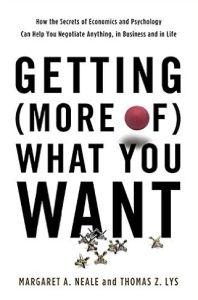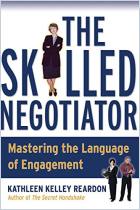Acesse a sua conta getAbstract para obter o resumo!

Acesse a sua conta getAbstract para obter o resumo!
Margaret A. Neale and Thomas Z. Lys
Getting (More of) What You Want
How the Secrets of Economics and Psychology Can Help You Negotiate Anything in Business and in Life
Basic Books, 2015
Sobre o que é?
Whether you love or hate negotiating, you must learn how to get more of what you want.
Recommendation
Negotiation is an essential skill. Yet people tend to regard the ability to negotiate as a personality trait to develop rather than as an expertise to build. Margaret A. Neale of the Stanford Business School and Thomas Z. Lys of the Kellogg School of Management at Northwestern University offer the ultimate negotiating model. They base their approach on extensive research and the precepts of behavioral economics. Their book covers such negotiating basics as how to create and claim value, and then it delves into more complicated aspects of negotiating, such as power plays and concessions. Unfortunately, repetition and circular logic sometimes muddy their stream of thought. If you find yourself rereading certain passages looking for clarity just check the helpful end-of-chapter summaries. getAbstract recommends this in-depth behavioral analysis of negotiating strategy to those seeking to elevate their prowess at the bargaining table.
Summary
About the Authors
Margaret A. Neale teaches at the Graduate School of Business at Stanford University and wrote Negotiating Rationally on bargaining. Thomas Z. Lys teaches accounting at the Kellogg School of Management at Northwestern University and edits the Journal of Accounting & Economics.

















Comment on this summary